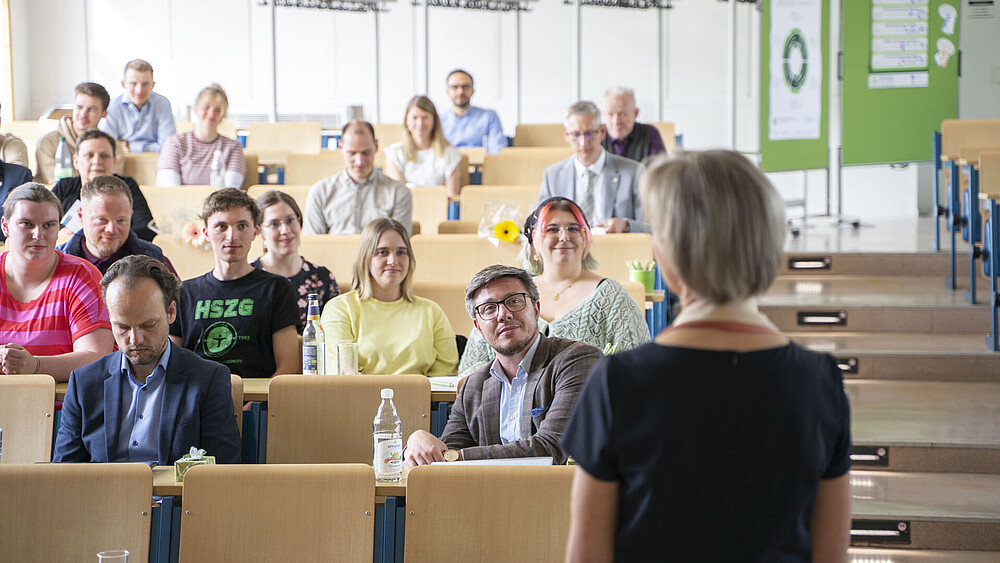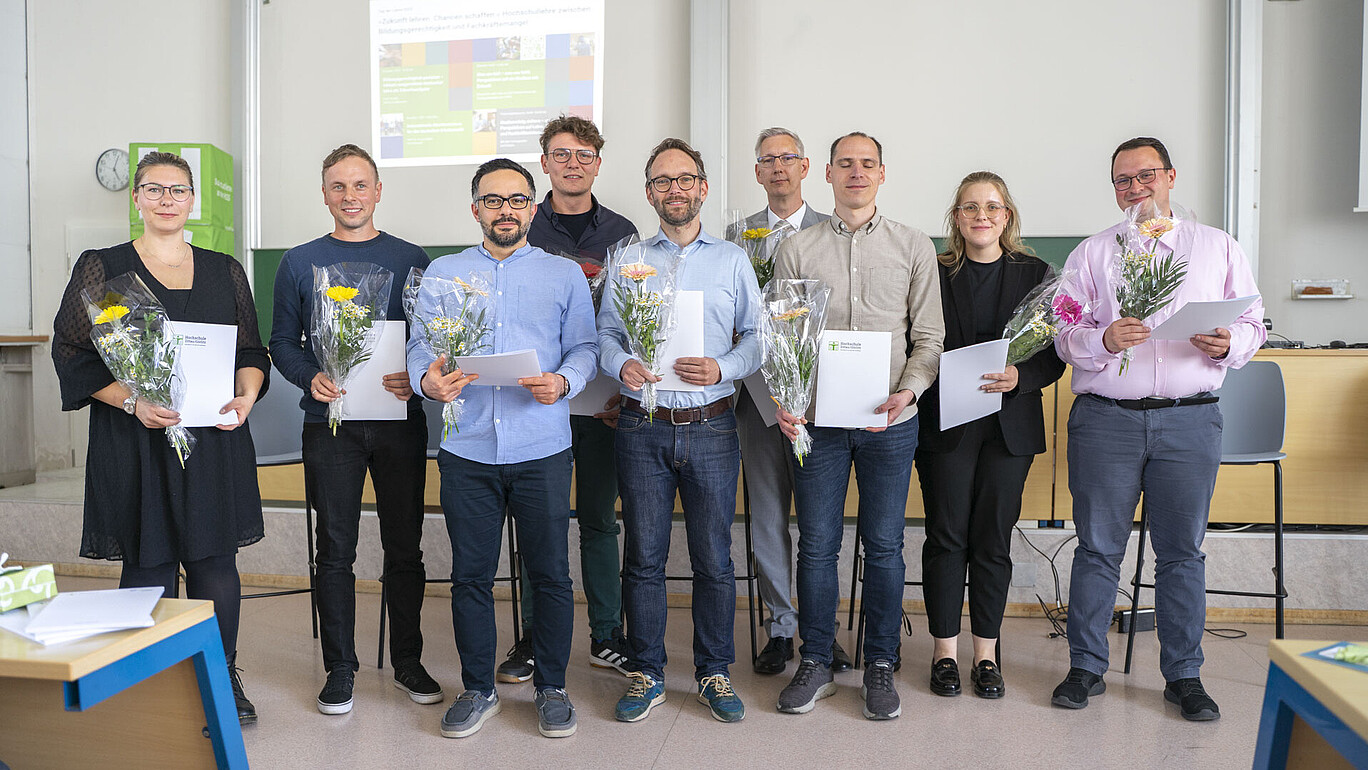The motto of Teaching Day 2025 was "Teaching the future. Creating opportunities".

On May 14, 2025, the focus at Zittau/Görlitz University of Applied Sciences was on future-oriented teaching: under the motto "Teaching the future. Creating opportunities. - University teaching between educational equality and a shortage of skilled workers" this year's Teaching Day took place at the Zittau campus. Over sixty interested university members gathered to discuss current issues relating to the further development of university teaching.
The event was opened by Professor Małgorzata Maćkowiak, who accompanied the Teaching Day for the first time in her new role as Vice President for Education and Sustainability. In her welcoming remarks, she spoke with palpable joy about the personal significance of this moment and the opportunity to play an active role in shaping this special day.
Together with Professor Jens Meinert, Dean of the hosting Faculty of Mechanical Engineering, she kicked off a varied program with three inspiring keynotes, an engaging panel discussion and a ceremonial degree with the presentation of certificates of participation to the graduates of the basic course in university didactics.
Speaker: Prof. Dr. phil. Martin Goldfriedrich, Faculty of Social Sciences
In his lecture, Professor Martin Goldfriedrich illustrated how university teaching can be made fairer and more effective through inclusive didactic thinking and action. Among other things, he introduced the "Inclusion Didactic Network" as an innovative planning tool and presented the results of a nationwide study on anchoring inclusion pedagogical skills in teacher training.
"Inclusive university didactics means designing teaching in such a way that it opens up learning spaces for all students - regardless of their biographical circumstances."
Speakers: Julia Jurczyk (culture and management, 4th semester) and Adrian Derr (electrical power systems in the KIA model, 6th semester), Student Council of the HSZG
The representatives of the Student Council impressively emphasized the importance of individual support, accessibility and diversity in everyday student life. Their voice was a strong plea for a university that not only teaches the future, but also lives it.
"We want everyday student life to be inclusive and for all students to feel supported, well accompanied and prepared." Adrian Derr
"To ensure that studying remains accessible to all people in the future, we need a university that continues to work with heart and vision for accessibility and equal opportunities - not as a final goal, but as a common path." Julia Jurczyk
Click here for the presentation.
Speaker: Prof. Dr. rer. pol. habil. Knut Petzold, Faculty of Social Sciences
Professor Knut Petzold pointed out that although international students largely want to stay in Germany and represent added economic value, they are often overlooked on the job market. Universities can play a key role here by acting as a bridge between skilled workers and employers.
"Universities must act more as active intermediaries in order to tap into the potential of international students for the German labor market - with practical contacts, certificates and visibility."
Click here for the presentation.
More information about Prof. Dr. rer. pol. habil. Knut Petzold.

In the subsequent panel discussion, moderated by Emil Ehrentraut, a student on the Bachelor's degree program in Culture and Management, Professor Martin Goldfriedrich, Professor Knut Petzold, Professor Jana Stolz-Römmermann (Chair of Tourism Management at the Faculty of Managerial and Cultural Studies), Aline Schulz from the studienerfolg@saxHAW education project and Julia Jurczyk and Adrian Derr from the Student Council discussed the interplay between teaching, participation and securing a skilled workforce. The discussion showed once again how important it is to strategically develop university teaching that sees the diversity of its students as a resource.
Another highlight was the awarding of certificates of attendance for the basic course in university didactics by Vice President Maćkowiak. The basic course is the foundation module of the Saxon University Didactics Certificate. In 60 compact working units, a sound introduction to central topics of good teaching - from student-centeredness and didactic planning to reflecting on one's own teaching activities - was provided.
I am delighted that so many committed lecturers at our university have successfully completed the basic university didactics course. This willingness to reflect and develop is crucial for university teaching that really reaches students. The course not only provides methodological tools, but also raises awareness of how teaching can be designed responsibly and effectively.
”The Teaching Day 2025 made it impressively clear that educational equality and securing skilled workers are mutually dependent. Only equitable, inclusive university teaching can develop the potential of all students and thus make a sustainable contribution to securing qualified specialists.
We, in our university community, try to create our future, the future of our region, according to our possibilities. We exchange ideas, discuss, deal with a wide range of problems and look for solutions. Our young people are committed and curious, and we as a university support their activities through our policy of equal opportunities. We also keep them closely involved with us and the border triangle through individual support and numerous contacts with various regional institutions and companies.
”We are already looking forward to the Teaching Day 2026, which will take place at the Görlitz campus as scheduled. In the coming year, we would once again like to discuss key future issues of university teaching with lecturers, students and guests - with new impulses, exciting perspectives and the proven space for exchange and networking.
A big thank you goes to Professor Martin Goldfriedrich, Professor Knut Petzold and Professor Jana Stolz-Römmermann as well as Julia Jurczyk, Adrian Derr and Aline Schulz - for their great commitment, their careful professional preparation and the valuable impulses with which they enriched the event.
Vice President Maćkowiak would like to express her special thanks to the dedicated organization team - Daniel Winkler and Julia Rülicke - as well as to Sven Müller for the great photographic accompaniment
Finally, we would like to thank all participants of the Teaching Day 2025. Your interest, your contributions and your openness shaped the day - we are already looking forward to further exchanges with you!